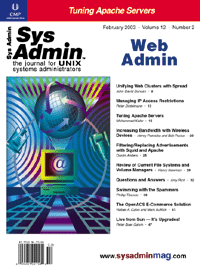 syslog syslog
This issue of Sys Admin contains several articles describing
useful tools and techniques for Web administration. John Duncan
shows how to unify Web clusters with Spread. Peter Dintelmann and
Mohammed Kabir share Apache configuration tips, and Dustin Anders
demonstrates how to use Squid and Apache to block Web banner ads.
Joe "Zonker" Brockmeier, occasional contributor to Sys Admin
and UnixReview.com's "Open Road" columnist, recently wrote an article
for NewsFactor.com titled "The Rogue DNS Phenomenon". In the article,
Brockmeier talks about OpenNIC, an alternative to ICANN (Internet
Corporation for Assigned Names and Numbers), which is the international
body in charge of managing the Internet's domain name system. Brockmeier
explains, "At the end of each domain name is a Top Level Domain
(TLD). Right now, the most widely used system is controlled by ICANN
and includes the TLDs with which most people are familiar, such
as .com, .net, and .org." Other familiar names, such as .edu, .mil,
and .gov are administered separately by their own NICs.
Brockmeier writes, "Like ICANN, OpenNIC (http://www.opennic.unrated.net/)
governs registration for domains under its purview. OpenNIC registrars
maintain the technical information required for users to query DNS
servers with the name of a domain and then receive the proper IP
address in response." According to their Web site, OpenNIC is a
user owned and controlled alternative that offers top level domains,
such as .indy, .geek, .null, .oss, and .parody. Descriptions of
the intended use of these domain names are given on the Web site.
For many users, Brockmeier notes, "the concept of using an alternate
DNS system might sound a bit dodgy, but reaching OpenNIC's namespace
is not as hard as one might think. All you need to do is add one
or more of OpenNIC's DNS servers to your operating system's DNS
list. Once you have set up your OS to use an OpenNIC nameserver,
reaching sites within its namespace is a transparent process." As
Brockmeier points out, it's always nice to know there are alternatives.
For additional information, see the complete article at: http://www.newsfactor.com/perl/story/20076.html.
Sincerely yours,
Amber Ankerholz
Editor in Chief
|

